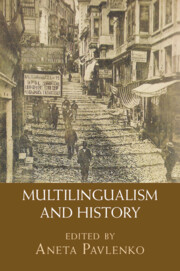Book contents
- Multilingualism and History
- Multilingualism and History
- Copyright page
- Contents
- Figures
- Contributors
- Acknowledgments
- 1 Multilingualism and Historical Amnesia: An Introduction
- 2 Greek Meets Egyptian at the Temple Gate: Bilingual Papyri from Hellenistic and Roman Egypt (Third Century BCE–Fourth Century CE)
- 3 Language Shift, Attitudes and Management in the Roman West
- 4 Languages at War: Military Interpreters in Antiquity and the Modern World
- 5 How Multilingualism Came to Be Ignored in the History of Standard English
- 6 Multilingualism and the Attitude toward French in the Latin Kingdom of Jerusalem
- 7 Why Colonial Dutch Failed to Become a Global Lingua Franca
- 8 How Unique Was Russia’s Multilingual Elite?
- 9 Language Ideology and Observation: Nineteenth-Century Scholars in Northwestern Siberia
- 10 Studying Historical Multilingualism in Everyday Life: The Case of the Habsburg Monarchy in the Nineteenth Century
- 11 Multilingualism and the End of the Ottoman Empire: Language, Script, and the Quest for the ‘Modern’
- 12 “Multilingualism Is Now a Must”: Discourses on Languages and International Cooperation at the Council of Europe
- 13 The Role of the Past in Language Revitalization
- 14 Historic Reenactments in Contemporary Spain: Fiestas de moros y cristianos
- 15 Multilingual Ghost Signs: Dissonant Languages in the Landscape of Memory
- Index
- References
8 - How Unique Was Russia’s Multilingual Elite?
Published online by Cambridge University Press: 20 April 2023
- Multilingualism and History
- Multilingualism and History
- Copyright page
- Contents
- Figures
- Contributors
- Acknowledgments
- 1 Multilingualism and Historical Amnesia: An Introduction
- 2 Greek Meets Egyptian at the Temple Gate: Bilingual Papyri from Hellenistic and Roman Egypt (Third Century BCE–Fourth Century CE)
- 3 Language Shift, Attitudes and Management in the Roman West
- 4 Languages at War: Military Interpreters in Antiquity and the Modern World
- 5 How Multilingualism Came to Be Ignored in the History of Standard English
- 6 Multilingualism and the Attitude toward French in the Latin Kingdom of Jerusalem
- 7 Why Colonial Dutch Failed to Become a Global Lingua Franca
- 8 How Unique Was Russia’s Multilingual Elite?
- 9 Language Ideology and Observation: Nineteenth-Century Scholars in Northwestern Siberia
- 10 Studying Historical Multilingualism in Everyday Life: The Case of the Habsburg Monarchy in the Nineteenth Century
- 11 Multilingualism and the End of the Ottoman Empire: Language, Script, and the Quest for the ‘Modern’
- 12 “Multilingualism Is Now a Must”: Discourses on Languages and International Cooperation at the Council of Europe
- 13 The Role of the Past in Language Revitalization
- 14 Historic Reenactments in Contemporary Spain: Fiestas de moros y cristianos
- 15 Multilingual Ghost Signs: Dissonant Languages in the Landscape of Memory
- Index
- References
Summary
In the eighteenth and nineteenth centuries, the Russian elite used a plethora of languages, situated in a complex web of shifting social values. This chapter charts the development of this multilingualism. Looking closely at the nature of language hierarchies in imperial Russia through a close study of a variety of archival materials, it questions the oft-repeated narrative of a Russian high society speaking predominantly French, to the detriment of their Russian skills. The chapter also examines whether the Russian case is, as is often claimed, unique, and argues that multilingualism in Russia shared characteristics with elite multilingualism found in other places and times.
Keywords
- Type
- Chapter
- Information
- Multilingualism and History , pp. 153 - 169Publisher: Cambridge University PressPrint publication year: 2023

